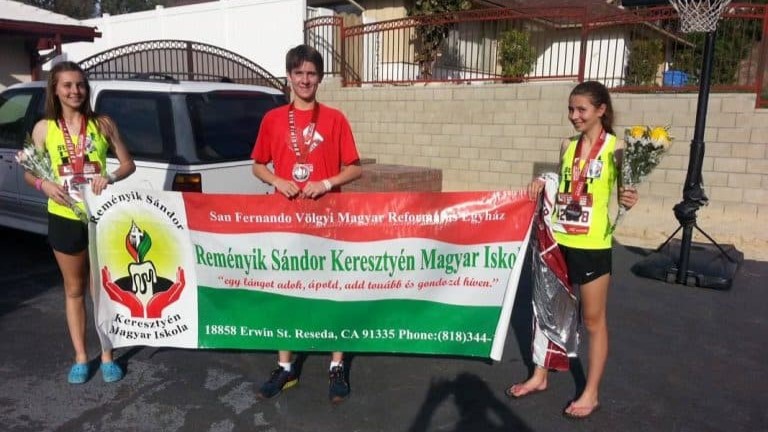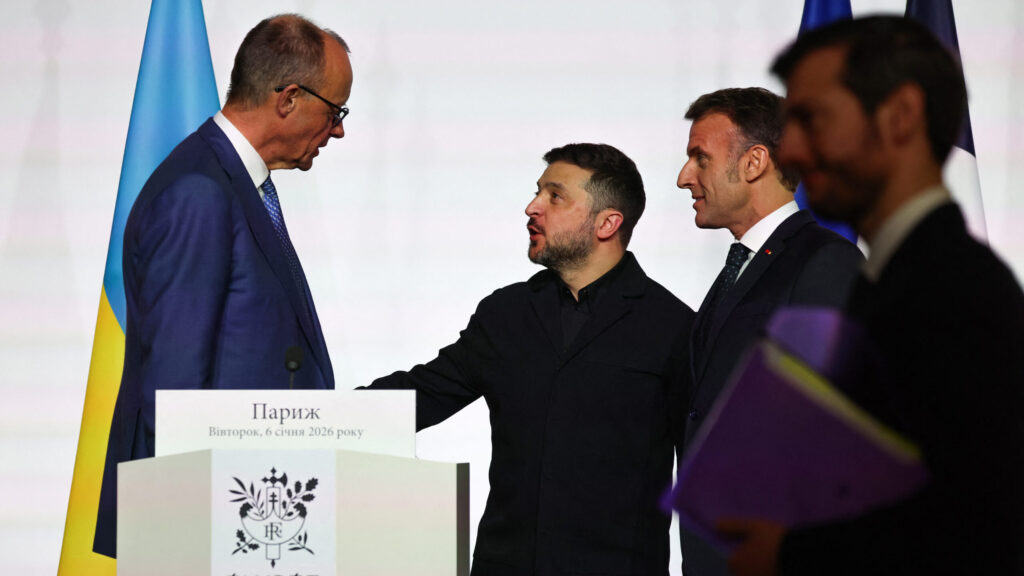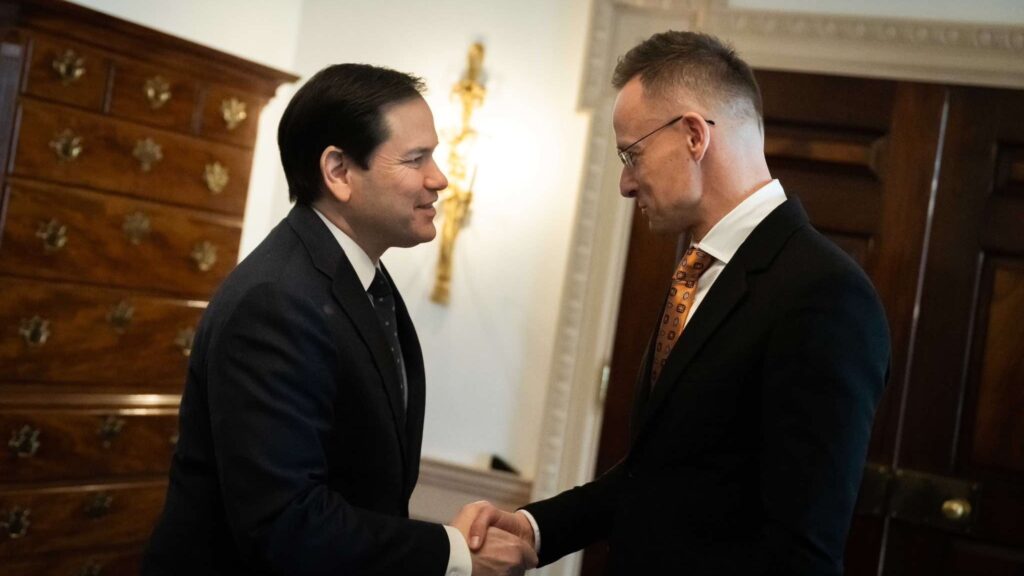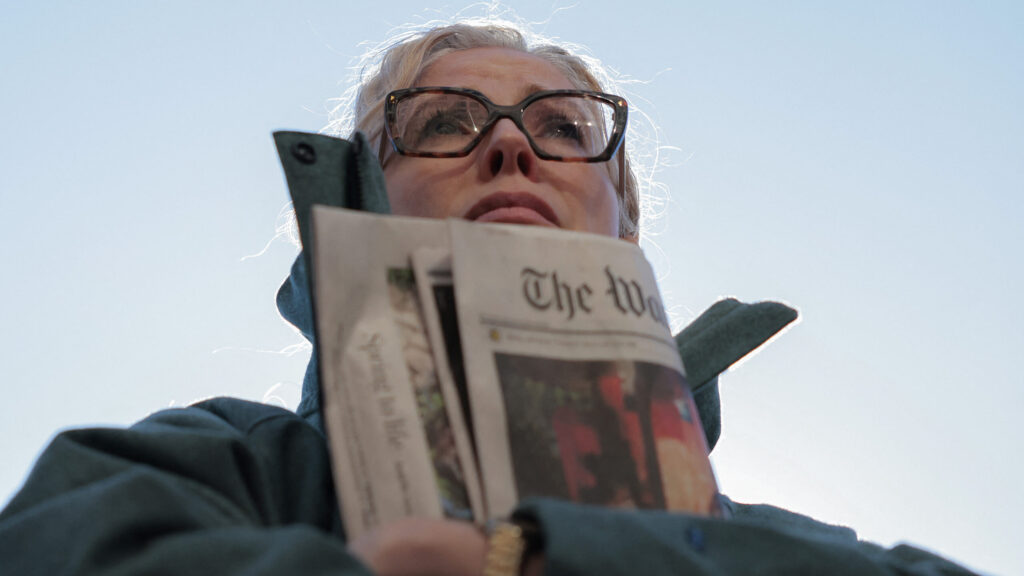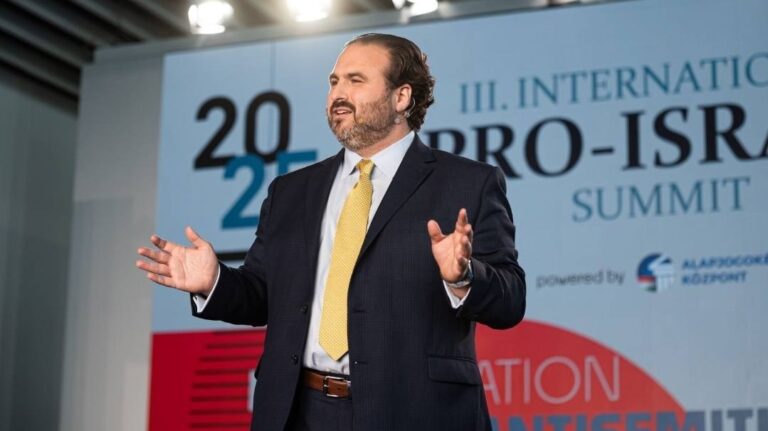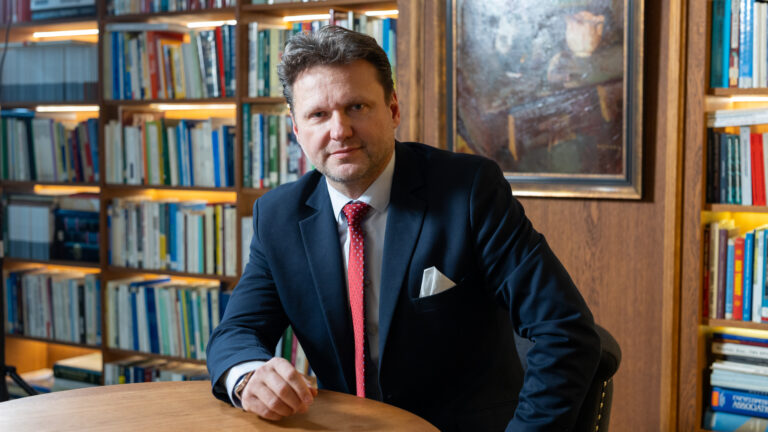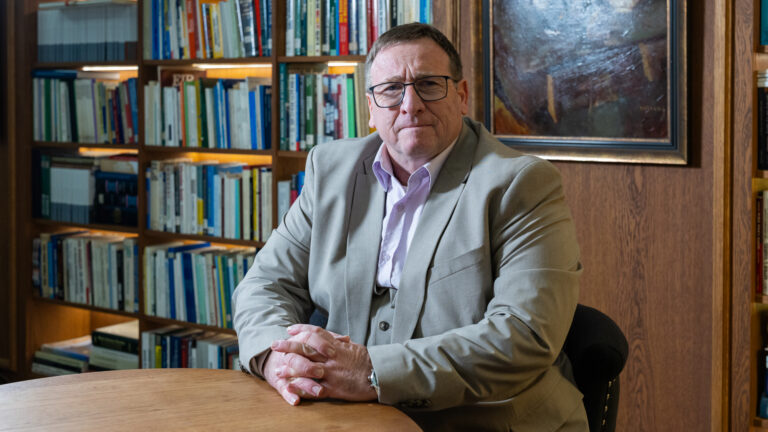This interview was first published in Hungarian on reformatus.hu.
Zsolt Jakabffy is a Hungarian Reformed pastor with five children who moved to Los Angeles from Partium (Western Romania) in 2001. Uncharacteristic of the diaspora, he also runs the Hungarian Sunday school, which he sees as a mission. The Reményik Sándor Christian Hungarian School, which works closely with the church, is perhaps the most robust Hungarian educational institution in the North American Hungarian diaspora, with a student drama group, a folk-dance group, a library and a school newspaper. The school and the church organize two balls and a May Festival every year, and they put an increasing emphasis on their family-oriented spiritual programs, too.
***
Why did you become a pastor?
My mother always dreamed of her only son becoming a pastor. She never told me her reason, and we weren’t regular church goers. I was studying to be an engineer, while participating in an amateur theater group, composed music and played in an orchestra, as well as on a soccer team. I’ve always considered my Hungarian identity important; I went to youth Bible classes and organized youth camps, which was not easy in Transylvania and Partium in the late ’80s because of the double—communist and Romanian—oppression imposed on us. In January 1990, a few weeks after the Romanian revolution broke out there, we traveled to Temesvár (Timișoara, Romania) with my family. What I saw there shook me up completely and made me raise questions: there must be a deeper explanation for all this than human emotions being pitted against each other. I began to study the Bible more deeply, and almost within weeks I felt that what I needed wasn’t a career in engineering, but the desire to find—and especially to give—answers to the deep questions that were constantly emerging in the world, answers that might defy the world’s drift, but were the only true ones. This is how I came to theology, abandoning the scientific path.
Did you meet László Tőkés at that time?
No, but later when I was serving in the youth department of the Reformed Diocese of Királyhágómellék (Pașul Craiului) after graduating from university in Kolozsvár (Cluj). Being his colleague was a defining experience, I learned a lot from him, I truly respect him. I perhaps got that position close to him, because in the early years of my pastoral career, and even as a theology student, I organized many successful youth activities, such as folklife and archery camps in the Kőrös (Criș) region. I was constantly and actively seeking contact with the younger generations, trying to attract them to the house of the Lord, because I felt that they were its future. I even wrote a rock opera called Pilate, which we performed in ten or so church communities. I’ve always respected the elderly, and in my current congregation I value and care for them, but someone has to carry on what they have created, so we need to bring the ages together.
When did you start a family and why did you leave for America?
Rózsa and I met when she visited her family at my first service location, in Fugyivásárhely (Oșorhei) near Nagyvárad (Oradea), for a performance of the rock opera that I mentioned. We married in 1998, and the following year Ákos was born, followed by Koppány in 2001. He was three weeks old when our American adventure began; our three daughters, Édua, Kincső and Katinka were born in the U.S.
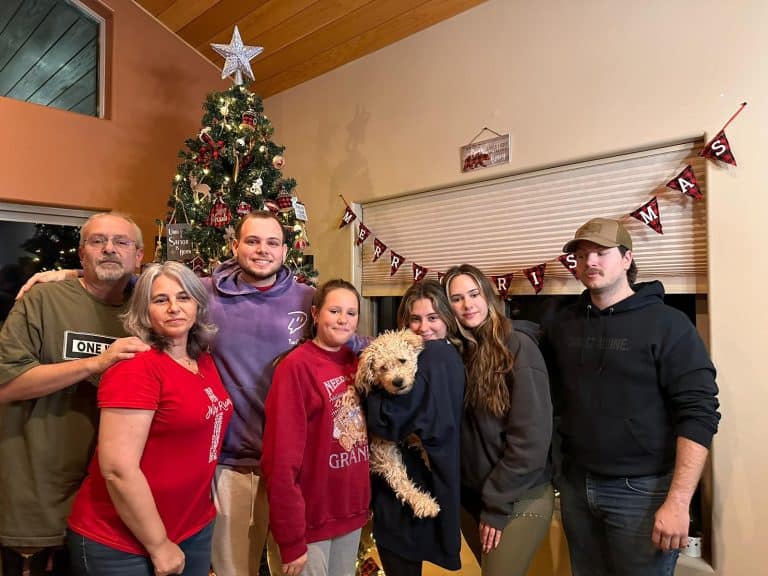
At the time, I was serving in Mezőtelki (Telechiu), 30 kms north of Oradea. I was also working in the Bishopric and was editor-in-charge of the church newspaper, the Harangszó, so I used to go to Nagyvárad daily. One of my colleagues had connections with the San Fernando church in California, and I found out from him that there was a pastor vacancy there. He encouraged me to apply and I discussed it with my wife. I was happy with our service location at the time, my wife had an excellent job as a chartered accountant, we didn’t need America. Nevertheless, we decided to give it a try. I was selected in March 2001. It’s likely that God was involved. After more than 20 years, I can pretty much understand why…
Could you explain?
People often ask me: was I homesick, do I regret it? I’ve lost many dear old friends and, more importantly, I’ve lost many years of my parents’ old age, some of which I could have spent close to them. Yet, God gave me at least the chance to be with my mother in her final days. I regret the loss, but I can understand why, as a pastor from Transylvania, I found myself in a context that is similar to the one I left: a foreign language environment where Hungarian identity and heritage must be preserved. In Mezőtelki, which is a village with a mixed ethnic population but with a Romanian majority, we ran a Hungarian kindergarten—this is howwe tried to keep the Hungarian identity there, continuing the work of our predecessors. Here, we are doing the same, but in a much larger geographical dispersion, almost the size of Hungary. We are trying to pass on what God has entrusted to us: faith, language, culture and nationality. Over the past 20 years, quite a few pastors have left after two or three years, they couldn’t cope with it. To do this service, we need the training that God has given us so far through our lives, enabling him to use us in the future.
What was waiting for you in Los Angeles?
The church had a lot of things nicely set up, but not everything worked well, so our first three years were fraught with tensions. Most ethnic churches in the U.S. are seen by many as a repository of national identity rather than a spiritual community. When the two roles clash and the scales tip, tensions arise. That’s what happened here, too. The tensions later settled down completely, the people involved reconciled, but at first the situation was acrimonious, and we had to pray to the Good Lord for the grace of making the church truly his house first and foremost. A bold decision had to be taken: the weekend school was moved to Sunday and was linked to the church. From then onwards, the two have worked hand in hand, just as our famous namesake, Sándor Reményik’s poem ‘The Church and the School’, describes. We lost a few families through this transition, but within a few years we experienced dramatic growth. The Covid pandemic diminished us; since then, we haven’t really recovered, but we are confident that we’ll succeed.
What kind of numbers are we talking about? How big is the Hungarian population in the area, by the way?
There are no definite figures. There are probably between 130,000–170,000 people of Hungarian origin living in and around this city, but only about 10 per cent of them understand or speak Hungarian or consider themselves primarily Hungarians. Of the less than 20,000 people who consider themselves Hungarian, the local Hungarian organizations combined cannot reach more than 1,500 to 2,000 through the church and their festivals. Some people check in from time to time at the church, because for instance their grandfather died, or they have a bunch of Hungarian books that they regret throwing away. Or their grandmother died, and they need a short service. That’s how we find new people, three or four times a year. Unfortunately, quite a few of the Hungarians we’ve met in the past 20 years, who were born or used to live here, have moved to Texas, North Carolina or Florida over the past couple of years because of the change in living conditions. At most, we’ll see 700 souls on May Day. Before the pandemic, we saw about 250 people in church at the Christmas and Easter services, with an average of about 80 at regular Sunday services and with 60 children at school. Today, 35–45 attend church regularly, and 40 attend the school. These are lower but stable numbers.
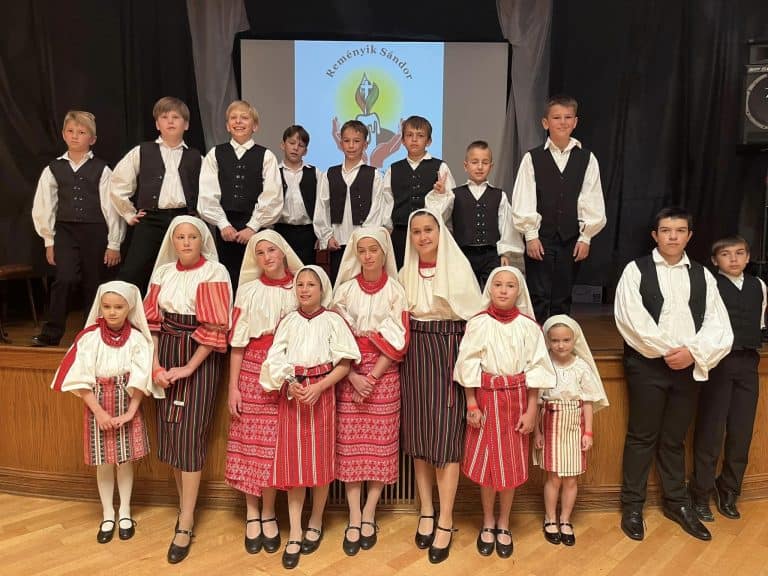
At the school, we have four hours of children’s activities weekly, a folk-dance group, a weekly school newspaper, and our own student drama group. The last time when I shared at a Hungarian educational conference what we do, several people asked me: is it all in one institution? Last year, one of our teachers attended a Balassi Methodology Conference. It turned out: of the 40 or so Hungarian schools in the North American diaspora, ours is probably the best structured. We try to cover all possible areas, and we train our children in a way that they can stand their ground. Parents take seriously one of the basic rules which is that they must speak Hungarian at home. Of course, where children grow up in mixed marriages, this principle doesn’t really work, but it helps a lot if there is contact with the Hungarian grandparents and thus the grandchild is ‘forced’ to speak Hungarian, while at the same time he or she is also getting to love the language. My daughters, for example, definitely enjoy having a secret language. Many of our children visit Hungary in the summer to study at the Rákóczi camps or on Balassi scholarships, or just spend part of the summer there with their parents or grandparents. These are meaningful opportunities.
They’ve asked: all this in one school, I’ll ask: all this in one person?
I couldn’t do it for a minute without the team I’ve been working with for eighteen years. The most recent newcomer is probably our kindergarten teacher and one of our schoolteachers, but they’ve already been here for five years. We have long-term working relationships; we rarely change people because we get on so well. We had a couple who ran the folk-dance group for 22 years. Unfortunately, for family reasons, they couldn’t continue, but when they stopped, the Kőrösi Csoma Sándor (KCSP) program started, and for the last few years, the KCSP scholars took over folk dance training. Our previous couple came back and István and Ágnes Vámosi, are also in their second year. Continuity and consistency are essential, much more can be achieved this way.
The idea of a student drama group was conceived in the community around 2014, when we were thinking about what to do with older children who are no longer attracted to Hungarian schools. A dear friend of mine, who works as a cinematographer and assistant director in the Hollywood film industry, has taken on the management of the Lármafa Student Stage. We have already put on stage more than ten performances, and this year we did a Hungarian folk tale. Afterwards, a member of the parents’ committee raised the idea of a weekly school newspaper. A very nice kindergarten teacher, another friend of mine, created the design and edited the first issue. Sadly, he passed away at a young age, but out of respect for him, we carry on the same image. Now our KCSP scholar István Vámosi faithfully compiles it every week. And some parents help keep our social media page up to date, where we always post the latest news.
There is also a school ball and two major church events. What is the story behind these?
It was the idea of our teacher Beáta Magyar’s husband that the Hungarian school shouldn’t only run on nominal monthly tuition fees, but we should have an annual fundraising event. Unfortunately, András, who took on the cooking, fell ill within two years and God called him home. Since then, we have dedicated the ball to his memory every year. The proceeds are used to improve the school. A total value of about 80,000 dollars has been collected and used in recent years to make the building better serve the harmonious cooperation of church and school. 20 years ago, the school looked different. Since then, we’ve added a library, two new classrooms, completely renovated the big hall, and remodeled the kitchen. We also installed cameras and a lockable gate system. We got some funding from Hungary, but most of the improvements were made from the profits of the school balls. This year’s proceeds will be used to convert the stage and to install a recording system so that the performances can be uploaded to an online platform.
For more than 15 years, the church and the Hungarian school have been running the May Festival hand in hand. In 1992 our church was the victim of an arsonist attack. Subsequently, the idea of a permanent fundraising campaign was born. The first one was held in the parking lot above the ruins, this year marked the 30th event in this series. There was another defining change in the congregation linked to this devastation. When I first came here, we had eight or nine music and dance events a year. My problem with those wasn’t that I didn’t like the style, but the fact that those events weren’t the mission of a faith-based community. We kept the May Festival and the Harvest Ball but shifted the focus to spiritual edification: today we have ‘silent days’ two or three times a year, summer camps and several sleep-away weekends for the children, often with parents staying for the first part of the event. These are all faith-building, faith-deepening, playful family occasions.
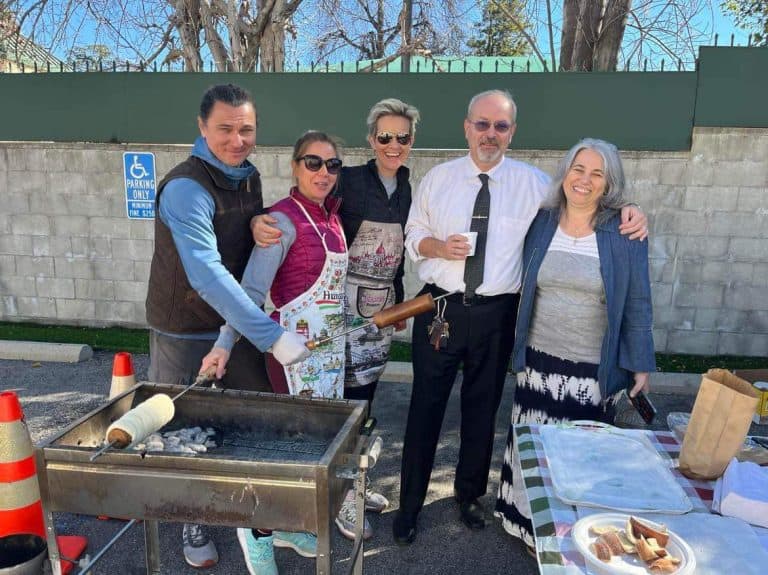
What did families think of these changes?
During the last 20–30 years, I know of barely five to ten people who have come to a cultural event first and stayed for school or worship. There are such miracles. But the church can only be sustained by those that carry it forward in faith, not by cultural events. And if there are no church goers, there will be no May Festival or Harvest Ball, and not even a Hungarian school. We aren’t here primarily to entertain the Hungarians, but to bring them to the knowledge that the Bible declares: God loved the world, so that He gave His only begotten Son, and whoever believes in Him shall not perish but have eternal life. However, the majority of parents who immigrated after the regime change of 1989–90 in Hungary grew up during or shortly after communism, receiving little or no spiritual or religious education, or turned to some fashionable Eastern mysticism. In my opinion, it’s quite an oversight on the part of the Christian churches back home that they have allowed this to happen at such a scale, but it’s not for me to judge them.
In any case, I consider the new families coming into the church and the Hungarian school as a mission field. I try to build community occasions where they are happy to come in and—while eating lángos or other Hungarian food—listen to what’s happening with their children or join a game with them, and this has a definite effect on them. It’s a wonderful process in which more and more are being touched by the Lord. We also have musical, modern services—we are trying to be open in every way—but some people aren’t interested at all in the Word of God. Yet, they ask when the next event will be, because their child loves it so much… It’s through these small steps that we try to get into their lives without forcing faith onto them. The real driver in all of this is my wife, whose deep faith is a blessing to our family and community. She builds the skeleton of the youth programs and partially leads them, I just put the content on top of it.
What do these children and family events look like?
The two or three ‘quiet days’ a year are primarily for the community. Since last year, we’ve been organizing a special event for Hungarian school-goer families, in which we take into account the religious maturity of the participants and adjust the theme accordingly. A surprising number of people participated. There was teaching, singing, prayer, conversation, we held family competitions, playful activities, outdoor worship and gazed at the stars at night. They loved it, and since then, they keep asking when the next one will be.
During the sleepover weekends, we started the faith-building process with the children, dubbing the program called ‘God Investigators’. We are looking for how to find God in everything from nature; this is how we try to shift them from the evolutionary theory taught in school to the Bible, which is much more logical and believable. The one-week summer camps started in 2005, but when the Hungarian government started organizing the Rákóczi and other camps in 2011, we stopped. Now, in agreement with our KCSP scholars, we’ve decided that it’s time for another camp. István Vámosi is an expert in Hungarikums (traditions that are characteristically Hungarian), hence the name of the camp: Faith and Hungarikum Camp. In the morning sessions, we’ll hear about Hungarikums, in the afternoon the ‘God Investigators’ will investigate, and in the evening, we’ll discuss both topics around the campfire. During the day, we plan to eat Hungarian delicacies from Pick salami to goulash soup. So far, we have nine applicants, and when we reach fifteen, we’ll open up the remaining five slots to Hungarian children who don’t attend our school.

